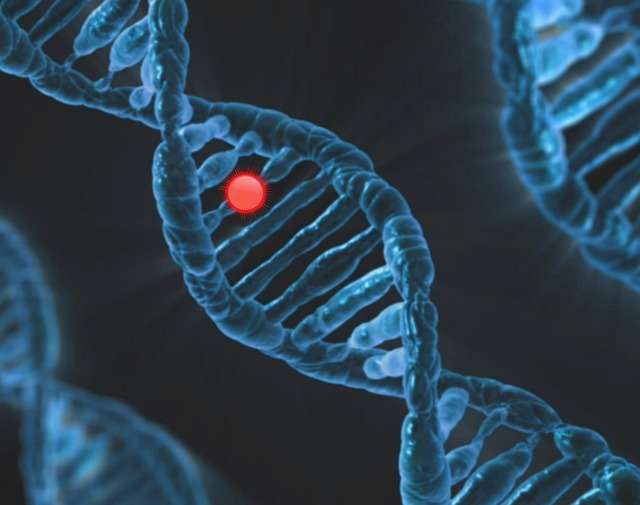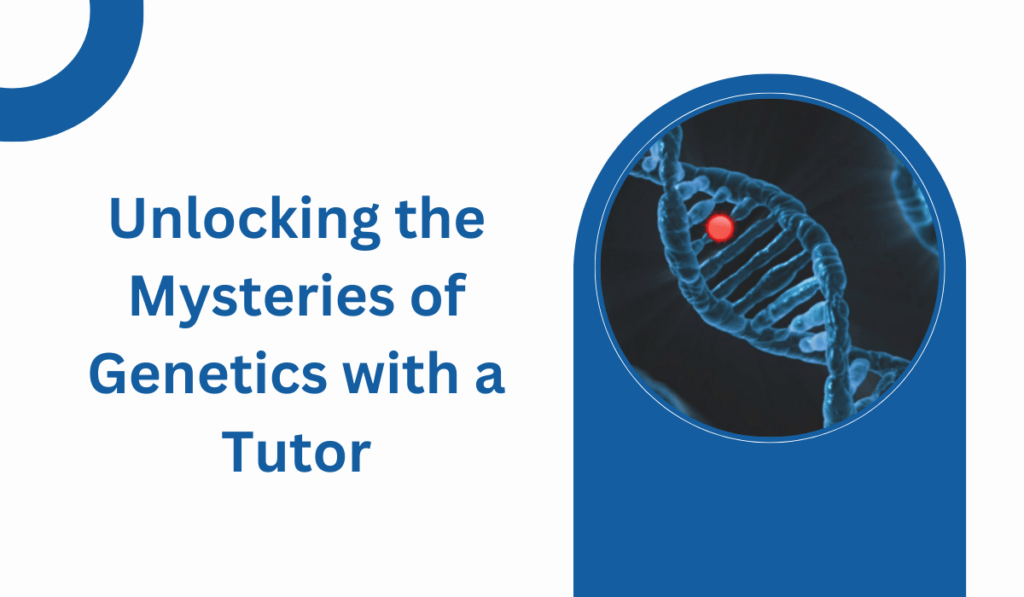Genetics is a captivating field that reveals the blueprint of life, from the DNA that defines our identity to the genetic variations that make each person unique. Despite its significance, the complexities of genetics can often be daunting for students.
This is where personalized tutoring comes into play. A genetics tutor can break down intricate concepts, making learning both engaging and effective. In this blog, we’ll dive into how a genetics tutor can help demystify the subject and enhance your understanding of this essential science.
What is Genetics?
Genetics is the branch of biology that studies genes, genetic variation, and heredity in organisms. It encompasses several key concepts:
DNA and Genes
DNA (Deoxyribonucleic Acid) is the molecule that contains the instructions for building and maintaining all living organisms. It is composed of two strands that coil around each other to form a double helix. Each strand is made up of nucleotides, which are subunits that contain a sugar, a phosphate group, and a nitrogenous base. The sequence of these bases (adenine, thymine, cytosine, and guanine) determines the genetic information.
Genes are specific sequences of nucleotides within the DNA that code for proteins, which perform most of the functions in our bodies. Each gene has a unique location on a chromosome and can vary in size. Some genes act as instructions to make molecules called proteins, while other genes do not code for proteins but play regulatory roles.
Chromosomes
Chromosomes are long, thread-like structures made of protein and a single molecule of DNA. They are found in the nucleus of most living cells and carry genetic information in the form of genes. Humans have 23 pairs of chromosomes, for a total of 46. Each parent contributes one chromosome to each pair, meaning children inherit half of their chromosomes from each parent.

Inheritance
Inheritance is the process by which genetic information is passed from parents to offspring. It explains why children resemble their parents and how traits are transmitted across generations. The field of genetics has uncovered various patterns of inheritance, such as dominant and recessive traits, co-dominance, and sex-linked traits.
Why is Genetics Important?
Genetics plays a vital role in various aspects of our lives:
Medical Advancements
Understanding genetics can lead to breakthroughs in treating genetic disorders and personalized medicine. By studying genes, scientists can identify mutations that cause diseases, develop genetic tests for early diagnosis, and create targeted therapies. For example, gene therapy involves introducing or altering genetic material within a patient’s cells to treat or prevent disease. Additionally, pharmacogenomics studies how genes affect a person’s response to drugs, allowing for personalized medicine where treatments are tailored to an individual’s genetic makeup.
Evolution and Biodiversity
Genetics helps explain the diversity of life and evolutionary processes. The study of genetic variation within populations provides insights into how species adapt to their environments and evolve over time. Genetic research can reveal the evolutionary relationships between species, trace the origins of populations, and understand the mechanisms of speciation. This knowledge is essential for conserving biodiversity and protecting endangered species.
Agriculture
Genetic research is crucial for developing disease-resistant and high-yield crops. Through techniques like genetic modification and selective breeding, scientists can enhance desirable traits in plants, such as pest resistance, drought tolerance, and improved nutritional content. This has significant implications for food security, sustainable agriculture, and addressing the challenges of a growing global population.
The Complexity of Genetics
Genetics is not just about simple inheritance patterns. It involves understanding complex concepts such as:
Genetic Variation
Genetic variation refers to the differences in DNA sequences among individuals. This variation can result from mutations, gene flow, and sexual reproduction. Mutations are changes in the DNA sequence that can occur naturally or due to environmental factors. Gene flow is the transfer of genetic material between populations, which can introduce new genetic variants. Sexual reproduction combines genetic material from two parents, creating offspring with unique genetic combinations. Genetic variation is essential for evolution and adaptation, as it provides the raw material for natural selection.
Genetic Disorders
Genetic disorders are conditions caused by abnormalities in the genome. These can result from mutations in a single gene (monogenic disorders), multiple genes (polygenic disorders), or changes in the number or structure of chromosomes. Examples of genetic disorders include:
- Down Syndrome: Caused by an extra copy of chromosome 21.
- Cystic Fibrosis: A monogenic disorder caused by mutations in the CFTR gene.
- Sickle Cell Anemia: Caused by a mutation in the HBB gene, leading to abnormal hemoglobin.
Understanding genetic disorders is crucial for diagnosis, treatment, and genetic counseling. Advances in genetic research have led to the development of diagnostic tests, gene therapies, and personalized medicine approaches to manage these conditions.
The Role of a Genetics Tutor
A genetics tutor can make learning genetics accessible and enjoyable. Here’s how:
Personalized Learning
Every student has a unique learning style. A tutor can tailor lessons to fit individual needs, ensuring that difficult topics are understood thoroughly. For instance, a tutor can focus on:
- Simplifying Complex Topics: Genetics involves intricate concepts like gene expression, genetic mutations, and epigenetics. A tutor can break these down into understandable segments and provide analogies and real-life examples to make the material relatable.
- Customized Practice Problems: Tutors can provide practice problems tailored to the student’s level of understanding, helping reinforce learning and build confidence.
Simplifying Complex Concepts
Genetics involves many intricate details. Tutors can break down these concepts into manageable segments using:
- Analogies and Real-Life Examples: Making connections between genetic concepts and everyday experiences can help students grasp abstract ideas. For example, comparing DNA to a recipe book where genes are individual recipes that instruct the making of specific proteins.
- Visual Aids: Diagrams, charts, and animations can illustrate genetic processes, such as DNA replication, transcription, and translation. These visual tools can make complex processes more understandable.
Interactive Learning
Tutoring sessions can be interactive and engaging through:
- Hands-On Activities: Experiments and practical exercises can demonstrate genetic principles. For instance, students can extract DNA from fruit, perform genetic crosses using model organisms, or simulate genetic inheritance with interactive software.
- Technology and Multimedia Resources: Using videos, online simulations, and virtual labs can enhance understanding and make learning more engaging. These resources can provide interactive experiences that reinforce key concepts.
Benefits of Studying Genetics with a Tutor
Studying genetics with a tutor offers numerous advantages:
Improved Academic Performance
Personalized attention leads to better grades and a deeper understanding of the subject. Tutors can identify and address specific areas where students struggle, provide targeted instruction, and offer feedback to improve performance.
Enhanced Critical Thinking
Genetics requires analytical skills, and tutoring helps develop problem-solving abilities. Students learn to think critically about genetic data, design experiments, and interpret results. These skills are valuable not only in genetics but also in other scientific disciplines.
Preparation for Advanced Studies
A strong foundation in genetics is essential for careers in science and medicine. Tutoring can prepare students for advanced courses in genetics, molecular biology, biotechnology, and related fields. It also helps students develop the skills needed for research and laboratory work.
Success Stories
Many students have benefited from personalized tutoring in genetics. For example:
| Student Name | Improvement | Testimonial |
|---|---|---|
| Alice | Improved her grade from C to A in biology | “My tutor made genetics so much easier to understand!” |
| John | Developed a strong interest in genetic research | “Tutoring helped me decide on a career in genetic counseling.” |
Finding the Right Genetics Tutor
Choosing the right tutor is crucial. Here are some tips:

Qualifications to Look For
- Educational Background: A tutor with a degree in genetics or a related field has the knowledge required to teach the subject effectively. Look for tutors with advanced degrees (Master’s or Ph.D.) in genetics, molecular biology, or related disciplines.
- Experience: Previous tutoring experience and positive reviews are indicators of a tutor’s ability to teach effectively. Look for tutors who have a proven track record of helping students succeed in genetics.
Questions to Ask
- What is your approach to teaching genetics?: Understanding the tutor’s teaching philosophy and methods can help determine if their approach aligns with the student’s learning style.
- Can you provide references from past students?: References and testimonials from previous students can provide insight into the tutor’s effectiveness and teaching style.
Resources and Recommendations
TutorLinkers Tutors
TutorLinkers offers a selection of qualified genetics tutors. Their tutors have strong educational backgrounds and experience in teaching genetics. They provide personalized tutoring sessions tailored to the student’s needs.
Additional Resources
To complement your tutoring sessions, consider these additional resources:
- Books: “The Gene: An Intimate History” by Siddhartha Mukherjee offers a comprehensive overview of genetics and its impact on our lives. It is an excellent resource for understanding the history and significance of genetic research.
- Online Courses: Coursera offers a variety of genetics courses from top universities. These courses can provide additional instruction and practice in specific areas of genetics.
Conclusion
Understanding genetics can be challenging, but with the right tutor, it becomes an exciting and rewarding journey. Whether you’re struggling with the basics or diving into advanced topics, a tutor can help you unlock the mysteries of genetics and achieve academic success. Personalized tutoring offers tailored instruction, interactive learning, and the support needed to excel in genetics. Explore the benefits of personalized tutoring and start your journey today with TutorLinkers. MedlinePlus Genetics.
For more knowledge please keep visiting our blog.




